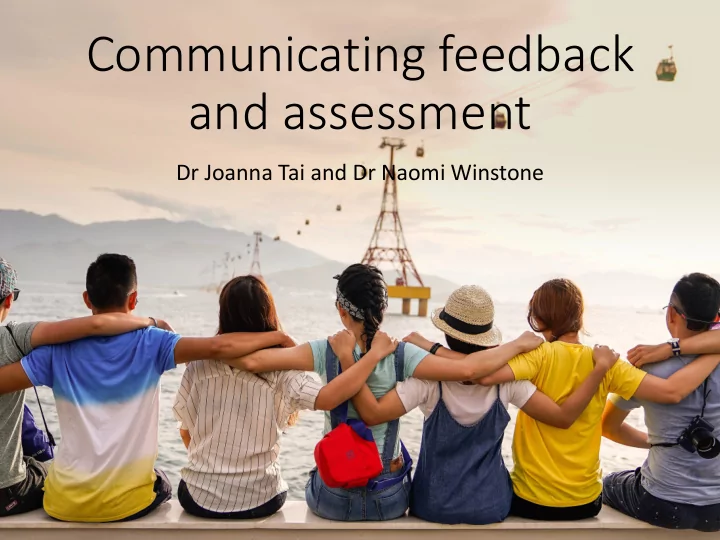

Communicating feedback and assessment Dr Joanna Tai and Dr Naomi Winstone
Communicating assessment rationales • Which two of these assessments are least familiar to you? • Essay • Research report • Presentation • MCQ Exam • Portfolio • Imagine you needed to explain to someone else the reason for choosing this task. By yourself, jot down 1-2 reasons why this assessment has been set • Discuss with your table
Interpreting feedback comments • For the following comments, consider: • If you had provided the comment, what would actions would you be expecting the recipient to take? • If you had received the comment, what actions would you take? Your structure could be clearer There are mistakes in your spelling and grammar Your writing could be more concise
Why communication matters…
What shared understandings do we need about feedback and assessment?
Why communication matters… Adcroft (2011) Mulliner & Tucker (2017) Students aligned with a Students’ perceptions of view of feedback as their engagement with improving performance; feedback are more teachers as facilitating positive than those of learning their teachers Students focus on written feedback; teachers on broader forms of dialogue Dawson et al. (2019) Carless (2006) For teachers, effective Teachers think feedback is about their feedback is feedback design; for more useful than students, about do their students feedback comments
The many duties of assessments • They have to encompass formative assessment for learning and summative for certification • They have to have a focus on the immediate task and on implications for equipping students for lifelong learning in an unknown future • They have to attend to both the learning process and the substantive content domain (Boud, 2000)
The purposes of feedback • Grade/mark justification? • Suggestions for improvement on the present task? • Suggestions which might be incorporated into future tasks? • Suggestions for learning? Other messages??? (Molloy & Boud 2013)
A shared understanding of quality a.k.a. evaluative judgement • Holistic perspective on what matters • For this task, in this context • In similar contexts • Beyond the university? BUT • Evaluative judgement is open ended • Continued development over time • Ideas of quality may shift • Who contributes to decisions about quality?
Feedback Literacy • Carless & Boud (2018) Carless, D., & Boud, D. (2018). The development of student feedback literacy: enabling uptake of feedback. Assessment & Evaluation in Higher Education , 43 (8), 1315-1325.
What activities can we do with students to develop a shared understanding of feedback and assessment?
Developing Evaluative Judgement To develop shared notions of quality To develop ability to process feedback information Self-assessment • Peer feedback/review • Feedback • Rubrics • Exemplars • Reflection •
Developing Feedback Literacy (1) Feedback guide (2) Feedback workshop (3) Feedback portfolio http://tinyurl.com/DEFTtoolkit Winstone & Nash (2016). The Developing Engagement with Feedback Toolkit (DEFT). York, UK: Higher Education Academy.
Using the DEFT • Small groups • Large groups • Single activities vs. learning programme • Independent activities • LMS
Developing feedback literacy https://tinyurl.com/FEATSportfolio
Developing feedback literacy
Engagement through partnership “Just talking about how feedback could be beneficial in this way has made me realise that I should probably make better use of it” “I think that through this project feedback will be a more interactive process because at the moment it feels like we’re on one side and the lecturers are on the other side, and now there’s more interaction”
Your turn In your context, where are the potential places for misunderstandings to develop in assessment and feedback? How can you resolve these through collaboration?
References • Boud, D. (2000). Sustainable assessment: rethinking assessment for the learning society. Studies in Continuing Education , 22 (2), 151–167. Retrieved from http://www.tandfonline.com/doi/abs/10.1080/713695 728 • Molloy, E., & Boud, D. (2013). Changing conceptions of feedback. In D. Boud & E. Molloy (Eds.), Feedback in Higher and Professional education: Understanding and doing it well . Milton Park: Routledge. • Tai, J., Ajjawi, R., Boud, D., Dawson, P., & Panadero, E. (2018). Developing evaluative judgement: enabling students to make decisions about the quality of work. Higher Education , 76 (3), 467–481. https://doi.org/10.1007/s10734-017-0220-3
Recommend
More recommend